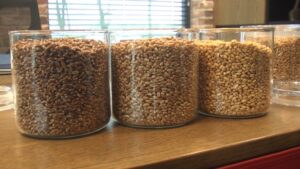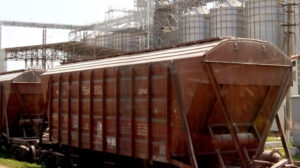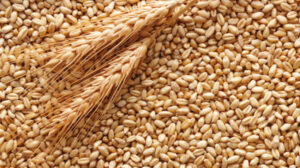
The logistics department of one of Ukraine’s largest grain market operators, Nibulon LLC, has transported over 40,000 tons of grain from its partners to the company’s elevators and ports since the beginning of the 2025-2026 marketing year (July-June), the grain trader’s press service reported on Facebook.
According to the report, about 100 of the company’s vehicles are currently working on harvesting its own products in various regions.
“33 trucks from the Nibulon fleet are fulfilling external orders, helping agricultural producers deliver their harvested crops on time,” the report said.
The agricultural holding noted that the company offers a full range of services for farmers: harvesting, transportation, storage, and further sale of products.
The “Transportation” service can be ordered via the NIBULON APP mobile application, where you can select a route, track your cargo in real time, and manage logistics from your phone. Grain is transported from the field to the Nibulon elevator, from the field to the port, and from the field to the warehouse.
The main advantages of the agricultural holding are an individual tariff depending on the distance (t/km); modern, economical equipment = lower cost; online cargo tracking; a chatbot for registering vehicles and unloading without queues.
NIBULON LLC was established in 1991. Before the Russian military invasion, the grain trader had 27 transshipment terminals and complexes for receiving agricultural crops, a capacity for one-time storage of 2.25 million tons of agricultural products, a fleet of 83 vessels (including 23 tugboats), and also owned the Mykolaiv Shipyard.
Before the war, Nibulon cultivated 82,000 hectares of land in 12 regions of Ukraine and exported agricultural products to more than 70 countries around the world. In 2021, the grain trader exported a record 5.64 million tons of agricultural products and supplied record volumes to foreign markets in August (0.7 million tons), in the fourth quarter (1.88 million tons), and in the second half of the year (3.71 million tons).
The grain trader is currently operating at 32% of its capacity, has created a special unit for demining agricultural land, and has been forced to move its central office from Mykolaiv to Kyiv.

As of September 19, farmers harvested 29.77 million tons of early grain and leguminous crops from 7.09 million hectares, which is 62% of the area sown with these crops, according to the Ministry of Economy, Environment, and Agriculture on its website.
Last year, as of September 20, 31.90 million tons of grain were harvested from 7.53 million hectares, meaning that the current figures are 6.7% and 5.9% lower, respectively, mainly due to the later start of the corn harvest.
As noted by the Ministry of Economy, 388,700 tons have now been harvested from 90,300 hectares, while last year at around this date, 2.40 million tons were harvested from 514,500 hectares.
As for wheat, its harvest is slightly higher than last year’s – 22.48 million tons from 5.02 million hectares compared to 22.30 million tons from 4.9 million hectares, while barley is slightly lower – 5.33 million tons from 1.35 million hectares compared to 5.50 million tons from 1.41 million hectares.
This year’s pea harvest is significantly higher – 626,600 tons from 266,000 hectares compared to 465,300 tons from 212,200 hectares last year, while buckwheat and millet are still significantly lower – 57,100 tons versus 99,400 tons and 45,400 tons versus 132,000 tons, respectively.
The harvest of other cereals and legumes this year reached 844,300 hectares as of September 19, compared to 1,000,000 tons as of September 20 last year.
It is noted that among the leaders, in particular, the Odessa region harvested 3.68 million tons from an area of 1.09 million hectares, the Vinnytsia region with 2.41 million tons from 434,400 hectares, the Kirovograd region with 2.21 million tons from 538,400 hectares, and the Khmelnytskyi region with 2.13 million tons from 306,700 hectares.
As for oilseeds, the rapeseed harvest is only slightly less than last year’s – 3.30 million tons compared to 3.4 million tons from the same area of 1.27 million hectares.
However, the harvest of soybeans and sunflowers is still ongoing, and there is a significant lag: 944,900 tons of soybeans have been harvested from 483,700 hectares, compared to 2.6 million tons from 1.3 million hectares on a similar date last year, while 2.41 million tons of sunflowers have been harvested from 1.37 million hectares, compared to 4.90 million tons from 2.4 million hectares.
In addition, sugar beet harvesting is also lagging behind: 632,500 tons have been harvested from an area of 12,700 hectares, compared to 1.7 million tons on the same date last year.
According to current data, the yields of wheat, barley, peas, rapeseed, and soybeans are roughly the same as last year, while corn and sunflower yields are lower so far, at 4.3 tons/ha versus 4.7 tons/ha and 1.8 tons/ha versus 2 tons/ha, respectively.
As reported, in its Inflation Report published at the end of July, the National Bank of Ukraine lowered its forecast for this year’s grain harvest from 61.7 million tons to 57.9 million tons, and for oilseeds from 22 million tons to 21 million tons.
The NBU recalled that last year, the grain harvest in Ukraine fell to 56.2 million tons from 59.8 million tons in 2023, while oilseeds fell from 21.7 million tons to 20 million tons.
According to forecasts by Deputy Minister of Economy Taras Vysotsky, this year’s grain harvest will be about 56 million tons, the same as last year.

In the first 16 days of September, 1 million 48.9 thousand tons of grain were exported by rail, which is 19.2% less than in August. Compared to the same period last year, the reduction amounted to 8.8%, according to the Rail.insider portal.
According to Valery Tkachev, deputy director of the transport technology and commercial operations department at Ukrzaliznytsia, 981,000 tons of grain were loaded onto the network in September, which is 12.5% less than a year earlier.
The total volume of all cargo transported during this period reached 1.25 million tons, which is 10.2% less than last year and 11.4% less than in August.
Most of the grain – 979,500 tons (93.4%) – was delivered to seaports. Only 69,400 tons (6.6%) were sent to western border crossings.
Since the beginning of September, almost 568,000 tons of grain have already been exported by rail.
In addition, since the beginning of the 2025/2026 marketing year (July 1), Ukraine has exported 5.028 million tons of grain and legumes. For comparison, during the same period last year (as of September 13, 2024), this figure was 8.59 million tons, meaning that the pace of exports has slowed significantly.

As part of a public-private partnership program, trading company Almeida Group LLC has signed a long-term lease agreement for the Bogdanivets Grain Processing Plant (Khmelnytskyi region) and increased its storage capacity by 92,000 tons, according to company director Maksym Volchenko.
“Thanks to the implementation of this project, Almeida Group has already exceeded its simultaneous storage capacity figures that were in place before the full-scale invasion,” he wrote on Facebook.
According to Volchenko, the Bohdanivets Bread Products Plant property complex includes an elevator with a total storage capacity of 92,000 tons, four independent grain receiving points from motor vehicles with a capacity of 3,000 tons per day, two grain drying complexes, a laboratory certified for all crops, railway infrastructure, and a mill with a capacity of 120 tons per day.
During August 2025, Almeida Group LLC carried out pre-season repairs and calibration of all equipment at the elevator complex, assembled a highly qualified team of company specialists, resolved a number of issues related to railway infrastructure, repaired a diesel locomotive, and restored access to the railway.
“As a result of this partnership, the Almeida Group has further increased its presence in the region in the elevator, trading, and logistics sectors, as well as gained another foothold for creating supply chains from producers to European and other export markets,” said the head of the enterprise.
Volchenko added that local producers now have the opportunity to order storage, laboratory control, and logistics services for the export of agricultural products with a full delivery cycle to ports or to European Union countries by land and water at rates that are attractive to agricultural producers.
Almeida Group LLC was registered in 2008. It specializes in the purchase and wholesale of grain crops and international transport and logistics services. It has six regional offices with its head office in Kyiv: in Kharkiv, Chernihiv, Chernivtsi, Uzhhorod, and Lviv.
Before the war, the company used a transshipment hub-elevator in Severodonetsk (Luhansk region). It has now been destroyed. In 2022, Almeida Group built a transshipment complex on the border with the EU at the Vadul-Siret station and resumed trading in grain crops.
In 2023, it built similar transshipment complexes at the Chop station (Zakarpattia region) and the Mostyska station (Lviv region). In 2025, the company took over the management of the Rozdorsky elevator from the G.R.Agro group.
In 2024, the USAID Economic Support to Ukraine Project purchased and transferred 25 new grain cars to Almeida Group LLC to increase agricultural exports.
The beneficiaries of Almeida Group are Mikhail Kudukhashvili and the owner of Levada Agricultural Production Cooperative, Maxim Volchenko.
Almeida Group, Bogdanivets Agricultural Production Cooperative, GRAIN

As of August 22, farmers harvested 27.25 million tons of early grain and leguminous crops from 6.7 million hectares, which is 60% of the area sown with these crops, according to the Ministry of Economy, Environment, and Agriculture.
Last year, as of August 23, 32.02 million tons of grain were harvested from 8.0403 million hectares, meaning that this year’s figures are 14.9% and 16.7% lower, respectively.
According to the Ministry of Economy, 21.01 million tons of wheat were harvested from 4 million 873.1 thousand hectares (last year – 21.74 million tons from 4 million 858.9 thousand hectares), barley – 4.97 million tons from 1 million 304.6 thousand hectares (5.5 million tons from 1 million 399.2 thousand hectares).
The average yield of these crops this year is 4.31 tons/ha and 3.81 tons/ha, respectively, which is 3.5% and 3.3% less than last year’s figures.
At the same time, this year’s pea harvest is already higher than last year’s – 0.58 million tons from 258,600 hectares compared to 0.468 million tons from 207,600 hectares, and the yield is 12.8% higher at 2.5 tons/hectare.
Other grains and legumes were threshed on an area of 260.6 thousand hectares, with a yield of 685.3 million tons (0.83 million tons).
It is noted that among the leaders are, in particular, the Odessa region, which harvested 3.44 million tons from an area of 1 million 083.4 thousand hectares, Kirovohrad region harvested 2.20 million tons from an area of 533.4 thousand hectares, and Vinnytsia region harvested 2.385 million tons from an area of 423.7 thousand hectares.
According to the ministry, as of August 22, the rapeseed harvest amounted to 3.163 million tons from an area of 1 million 283 thousand hectares, while last year on August 23, it amounted to 3.36 million tons from 1 million 227.7 thousand hectares, and the average yield is 7% lower than last year’s on this date and amounts to 2.5 tons/ha.
Sunflower harvesting has begun in the Dnipropetrovsk and Odesa regions, and soybean harvesting has begun in the Kharkiv region.
As reported, in its Inflation Report published at the end of July, the National Bank of Ukraine lowered its forecast for this year’s grain harvest from 61.7 million tons to 57.9 million tons, and for oilseeds from 22 million tons to 21 million tons.
The NBU recalled that last year, the grain harvest in Ukraine fell to 56.2 million tons from 59.8 million tons in 2023, while oilseeds fell from 21.7 million tons to 20 million tons.
According to forecasts by Deputy Minister of Economy Taras Vysotsky, this year’s grain harvest will be around 56 million tons, the same as last year.

The total forecast for wheat production in Ukraine for the 2025-2026 marketing year (July-June) is about 21 million tons, of which 10.3 million tons will be food wheat, while the harvest of grade 1-2 grain, which is needed to produce bread-making flour, is forecast at 1.7 million tons, according to Rodion Rybchinsky, chairman of the Ukrainian Millers’ Union.
“We are already seeing growing competition between processors and exporters for high-quality wheat, while farmers, who have the opportunity to store grain for several years, are in no hurry to sell it. This creates risks for price stability and the availability of flour and bakery products for consumers,“ the association’s press service quoted him as saying at the ”Khleb.ua” conference on its Facebook page.
Rybchynsky drew attention to the situation with rye. Domestic production of this crop in Ukraine does not fully cover domestic demand. In 2025/26 MY, flour millers will have to import about 9,000 tons, while in the previous season this figure was 1,600 tons. The expert emphasized that such an increase in imports indicates the formation of a persistent shortage of raw materials.
“The current production structure and behavior of farmers may lead to further increases in flour prices. While the shortage of first- and second-class raw materials already determines the industry’s prospects, the issue of food grain availability poses risks to the country’s food security,” stressed the head of the Ukrainian Millers Association.